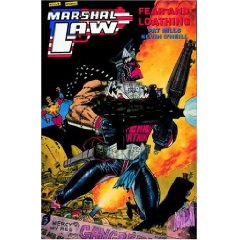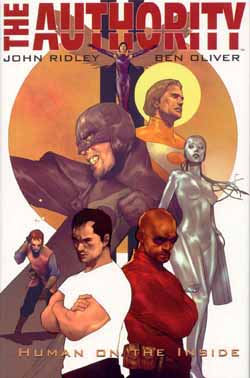
By Pat Mills & Kevin O’Neill (Titan Books/Dark Horse)
ISBN: 978-1-84023-452-7
Not everybody likes superheroes. Hard to believe, I know. Some folks actively loathe them. And then there’s Pat Mills…
One of the greatest creative forces in British comics, “the Godfather” (as nobody actually calls him) began at DC Thomson, wrote girls and humour comics for IPC and killed posh-comics-for-middle-class-kids stone-dead by creating Battle Picture Weekly (1975 with John Wagner and Gerry Finley-Day), Action (1976), 2000AD (1977) and Starlord (1978). Along the way he also figured large in the junior horror comic Chiller.
As a writer he’s responsible for Ro-Busters, ABC Warriors, Nemesis the Warlock, Sláine, Button Man and Metalzoic among many, many others as well as Battle’s Charley’s War (with the brilliant, sorely missed Joe Colquhoun): the best war strip of all time and one of the top five explorations of the First World War in any artistic medium.
Unable to hide the passions that drive him, his most controversial work is probably Third World War which he created for the bravely experimental Crisis. This fiercely socially conscious strip blended his trademark bleak, black humour, violence and anti-authoritarianism with a polemical assault on Capitalism, Imperialism and Globalisation. It even contained elements of myth, mysticism, religion and neo-paganism – also key elements in his mature work and the hero was a girl! So where’s the definitive collected edition of that, then?.
Some of his most fruitful collaborations happen when he teams with the utterly unique Kevin O’Neill, latterly the star turn of League of Extraordinary Gentlemen, but for years prior that weird guy whose “style of drawing” was banned by the American Comics Code Authority.
In 1987 Epic Comics, Marvel’s creator-owned mature material imprint, published a six issue miniseries that starred a hero very much in the vein of Judge Dredd, but one who took the hallowed tenets of the superhero genre and gave them a thorough slapping, Brit-boy style.
San Futuro is the reconstructed remnants of California after the Big Quake; the ultimate Metropolitan urban dystopia. America is recovering from another stupid exploitative war in somebody else’s country, and as usual the demobbed, damaged, brain-fried grunts and veterans are clogging the streets and menacing decent society. The problem this time is that this war was fought with artificially manufactured superheroes, and now they’re back their country is embarrassed and has no place for them.
Marshal Law was one of them, but now he’s a cop; burned-out, angry and disillusioned. His job is to put away the masks and capes, but as bad as they are, the people he works for are worse. Some heroes like The Public Spirit have the official backing of the government and can do no wrong – which is a huge problem as the solitary Marshal is convinced that he’s also the deadly rapist and serial killer called the Sleepman…
Much has been written about the cynical, savage parodies of beloved genre stars and motifs, the uncompromising satirical attacks on US policies and attitudes, even the overall political stance of this series. It’s largely all true. But what tends to be forgotten is that Fear and Loathing is also a cracking good yarn for thinking adults with mature dispositions, open minds, and a love of seeing injustice vicariously appeased.
Incisive, sharp dialogue, brilliant scenarios, great characters and a compelling murder mystery full of twists and surprises are all magnificently brought to life by the cruelly lush art and colours of Kevin O’Neill, an artist so crazed that every single panel is stuffed with so many visual and typographical ad-libs that you could read this story one hundred times and still find new treats to make you laugh and wince. So I’m thinking that perhaps you really should…
© 2002 Pat Mills & Kevin O’Neill. Art © 1989 Kevin O’Neill All Rights Reserved.

